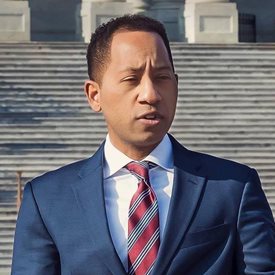Profiles
Amos Jones Shows How to Make a Broader Impact as a Solo Attorney
June 17, 2022
If you ask Amos Jones, founding principal of Amos Jones Law Firm, how he ended up specializing in constitutional law, he will tell you it was not by design. “I didn't choose constitutional law; constitutional law chose me,” he says.
Jones, a native of Lexington, Kentucky, and graduate of Harvard Law School, says his practice mostly serves “ordinary citizens without much power.” He adds, “Every time you turn around, some ordinary person without power is being dumped on by a powerful governmental agency or court action. This kept happening among my early clients.”
Going into solo practice wasn’t a hard decision for Jones. With three years of experience in international trade and commercial litigation gained at Bryan Cave Leighton Paisner LLP, he launched his firm in August 2010, the same year he became a visiting professor at North Carolina Central University School of Law.
“The decision to open my own firm in D.C. was the easiest decision ever because I knew I needed a formally established entity to continue serving clients and other folks presenting new matters, and the startup costs were low, thanks to the power of the internet,” Jones says.
“The solo practice was supposed to [handle] one-off matters to do what I sometimes call ‘angry-letter law’ — that is, to resolve discrete disputes efficiently and affordably. But [those] seemed to morph into years-long constitutional battles, despite my impulse to resolve cases with as little conflict as possible,” Jones adds. “That’s the part that I never expected — the way in which the simplest of matters needlessly [became] long ordeals. I didn't advertise, other than a website, for seven years. The people just kept coming.”
Tapping Into the Bar’s Resources
As a newly minted solo practitioner and constitutional lawyer, Jones says he turned to the D.C. Bar’s Practice Management Advisory Service (PMAS) for guidance. “Where do I start? The D.C. Bar’s boot camp for attorneys opening their own firms was absolutely invaluable,” Jones says.
Jones credited D.C. Bar practice management advisor Dan Mills and PMAS for providing him with the latest information on matters such as earned fees and trust accounts. An added value in being in a class with other solo and small firm practitioners, “some of whom were repeat takers because it was so good,” Jones says, was that these attorneys also became “helpful resources and sources of potential cross-referrals.”
Jones also took advantage of another free D.C. Bar resource: its ethics hotline. “An attorney in that division helped me come to what I think is a best practice when a client commits the kind of fraud contemplated precisely in a new ethics opinion. I sought clarification on the scope of that on-point opinion,” Jones says. “For me, a professor who taught legal ethics for years, that office was yet another source of value of being a member of this Bar.”
Practicing on the Cutting Edge
Jones says he chose to practice in the District to stay true to his commitment to make a positive impact “in the broadest manner that my capacity would allow in areas that, to me, are the most important in life and in the community.”
“In D.C., we get to practice on the cutting edge, and we often have the power to nationalize the issues in our cases. I brag to friends around the world that we have the most sophisticated Bar on the planet because we’re living in a modern-day Rome,” Jones says.
When he taught professional responsibility in another state, Jones noticed that their case book was full of opinions from the D.C. Court of Appeals. “That's because just about every type of complex problem [regarding] lawyer–client relations that could materialize in the practice of law has not only arisen here, but also has been litigated carefully, resulting in published opinions that are quite good and models for our 50 states, if not the world,” Jones says.
As a solo practitioner, Jones says his proudest accomplishments have been winning on appeal. “It’s always the best because it reminds the public that courts get things wrong all the time and that one person can make the law work as it purports to work on paper,” he says. “I’m proudest of having accomplished some important reversals without having to resort to the Supreme Court, and of my civic contributions recognized [by] two significant national lifetime achievement awards by the time I was 41 years old,” says Jones.
Spotlighting Models of Excellence
Jones also takes pride in his academic work. In 2014 he published an article in the North Carolina Law Review titled “The Old Black Corporate Bar: Durham’s Wall Street, 1898–1971.” Noting the emphasis in the early 2000s on “the new Black corporate bar,” which helped propel Barack Obama from the Illinois state senate to the White House, Jones wanted to call attention to a previous incarnation — the prosperous “Black Wall Street” of Durham. Jones says he strived to illustrate that Black professionals transformed law, policy, and politics even during the era of Jim Crow.
“The article analyzes the world in which that exceptional and heretofore unexamined Black bar germinated and influenced a relatively sophisticated legal landscape in a moderate, midsized southern city backdropped by a laissez-faire white leadership class that proved progressive for racial relations,” Jones explains.
At Emory University, where Jones earned his bachelor’s degree in political science, cum laude, he was awarded the Burt and Betty Schear Family Prize for being the “most likely to make a uniquely positive impact on his or her universe.” Jones works to do just that in his practice, “offering creative legal problem solving with effectiveness and efficiency,” he says.


